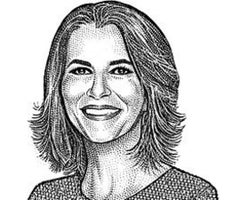MI SELECCIÓN DE NOTICIAS
Noticias personalizadas, de acuerdo a sus temas de interés

By Mary Anastasia O'Grady
Retiring Sen. Bob Corker, chairman of the Foreign Relations Committee, went to Latin America last week to “get a sense of a way forward” in U.S. relations with Venezuela. Unfortunately, the Tennessee Republican took a wrong turn and ended up in Caracas. He should have gone to Havana.
Venezuela is now a wholly owned subsidiary of Cuba’s 59-year-old military dictatorship. Without the full support of Cuba’s sophisticated intelligence and advanced police-state methods, Venezuela’s chavismo would have been overthrown years ago.
Mr. Corker should have known that calling on Venezuelan dictator Nicolás Maduro was worse than a waste of time and taxpayer resources. It was a favor to the Castro regime-yes, Raul still runs things-which for years has been promoting “dialogue” with the U.S. and the European Union as a way of buying time to tighten its grip on its satellite, Venezuela.
On the day of Mr. Corker’s visit, Fernando Alban, a member of the Venezuelan opposition, was eliminated in what had all the earmarks of a political murder. The 56-year-old Mr. Alban had been arrested at Simón Bolívar International airport in Maiquetía by security agents on Oct. 5. Three days later he died at the Caracas headquarters of Venezuela’s state intelligence agency, an arm of Cuban intel.
The dictatorship alleges that Alban, a devout Catholic, committed suicide by jumping out a 10-story window. Catholics believe suicide is a grievous sin. According to Alban’s friends and family, he never would have contemplated it.
Moreover, as one of Alban’s political allies asked in a series of rhetorical questions in the online Panam Post, aren’t the windows of the Sebin building sealed and the prisoners handcuffed? As to jumping from a bathroom window, a former prisoner who was held in that building has said two policemen always escorted him to the restroom.
Alban’s mysterious death while in custody bears a sordid resemblance to the fate of many a Cuban who refused to bend to the Castro regime, which has perfected the art of creatively disposing of dissidents. In 2011 Laura Pollan, leader of the Ladies in White, died of an inexplicable infection. Oswaldo Payá, winner of the prestigious Sakharov Prize, was killed in a 2012 car crash when the vehicle he was riding in was run off the road.
Denying water to political prisoners on hunger strikes causes kidney failure, which is how the Cuban regime killed Pedro Luis Boitel in 1972 and Orlando Zapata in 2010; the all-purpose “heart attack” strikes unexpectedly. Death by “suicide” is a police-state favorite.
Alban was a close friend of opposition leader Julio Borges, who is in exile in Colombia. According to the Spanish newspaper El Mundo, Alban’s friends say state security wanted its prisoner to finger Mr. Borges as the intellectual author of a drone attack against Mr. Maduro at a military parade in August.
Allegations of torture have emerged. William Jiménez, an official at the morgue where Alban’s body was taken, alleges in an online video that the autopsy found water in his lungs. Colombian news outlet NTN 24 wrote about the video, noting that Mr. Jiménez also claims that Venezuela’s minister of the interior ordered that the report remove that information. Mr. Jiménez is now in hiding.
A transparent postmortem would have resolved such questions. But requests for independent doctors to be on the scene were ignored. The El Mundo story cited former Venezuelan attorney general Luisa Ortega, who is also in exile and says she has “information, from inside,” that Alban drowned while being tortured.
A forthcoming research paper on “Cuba’s intervention in Venezuela” by Maria C. Werlau, executive director of the nonprofit Cuba Archives, traces the history of Cuba’s conquest. She notes that in 2007 the head of Cuba’s “committees to defend the revolution” claimed that they had more than 30,000 members in Venezuela. In November 2017 the Spanish news outlet EFE reported from Havana that Cuba officially claimed to have 46,000 civilians working in “almost 20 social programs” in Venezuela.
Ms. Werlau’s research indicates that many of these “collaborators” are paramilitaries masquerading as social workers. Also, Cuban doctors she interviewed said they were told, before they left on missions to Venezuela, that “they must be ready to, at any time, take arms ‘to defend the revolution.’ ”
Add to these “missions” Cuban military and security agents, and estimates for the total revolutionary infiltration run as high as 100,000. Cuba also controls tens of thousands of trained and armed Venezuelan gang members who terrorize the population with impunity.
Ms. Werlau observes that the numbers aren’t nearly as important as Cuba’s “strategically-placed assets guarding every aspect of society and an all-encompassing electronic command of information, communications, and citizens’ data.” From passports to property titles to the electoral system, Venezuelan sovereignty has been surrendered to Cuba, which, Mr. Corker might bear in mind, is a close ally of Iran, North Korea and Syria.
El BCE ha desvelado que ha impuesto sanciones en los últimos meses a BBVA y a Santander en Alemania por errores en su gestión
La compañía canadiense ha estado negociando con el gobierno panameño para que le permita vender el cobre que extraía antes de que comenzara el conflicto
Los cambios tienen como objetivo combatir el aumento de la violencia que ha aparecido en los titulares internacionales